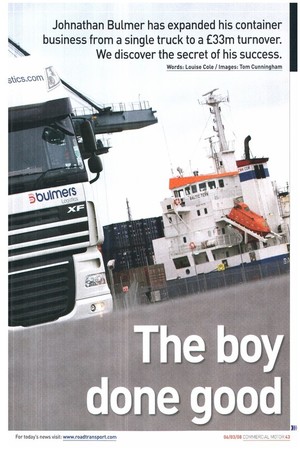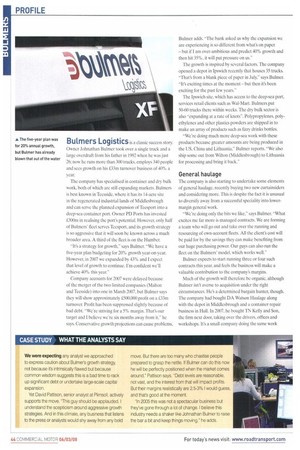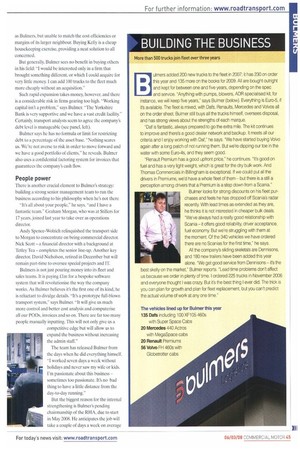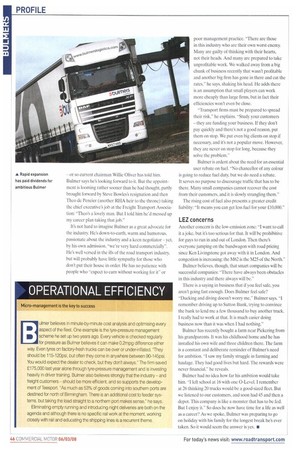The boy done good
Page 43

Page 44

Page 45

Page 46

If you've noticed an error in this article please click here to report it so we can fix it.
Johnathan Bulmer has expanded his container
Ikssib business from a single truck to a .03m turnover.
We discover the secret of his success.
Words: Louise Cole / Images: Tom Cunningham Bulmers Logistics is a classic success story. Owner Johnathan Bulmer took over a single truck and a large overdraft from his father in 1992 when he was just 26; now he runs more than 300 trucks, employs 340 people and sees growth on his £33m turnover business of 40% a year.
The company has specialised in container and dry bulk work, both of which are still expanding markets. Bulmers is best known in Teesside, where it has its 14-acre site in the regenerated industrial lands of Middlesbrough and can serve the planned expansion of Teesport into a deep-sea container port. Owner PD Ports has invested £300m in realising the port's potential. However, only half of Bulmers' fleet serves Teesport, and its growth strategy is so aggressive that it will soon be known across a much broader area. A third of the fleet is on the Humber.
"It's a strategy for growth," says Bulmer. "We have a five-year plan budgeting for 20% growth year-on-year. However, in 2007 we expanded by 43% and I expect that level of growth to continue. I'm confident we'll achieve 40% this year."
Company accounts for 2007 were delayed because of the merger of the two limited companies (Malton and Teesside) into one in March 2007, but Bulmer says they will show approximately £500,000 profit on a £33m turnover. Profit has been suppressed slightly because of bad debt. "We're striving for a 5% margin. That's our target and I believe we're six months away from it," he says. Conservative growth projections can cause problems, Bulmer adds. "The bank asked us why the expansion we are experiencing is so different from what's on paper — but if I am over-ambitious and predict 40% growth and then hit 35%, it will put pressure on us.
The growth is inspired by several factors. The company opened a depot in Ipswich recently that houses 35 trucks. "That's from a blank piece of paper in July," says Bulmer. "It's exciting times at the moment — but then it's been exciting for the past few years."
The Ipswich site, which has access to the deep-sea port, services retail clients such as Wal-Mart. Bulmers put 50-60 trucks there within weeks. The dry bulk sector is also "expanding at a rate of knots". Polypropylenes, polyethylenes and other plastics powders are shipped in to make an array of products such as fizzy drinks bottles.
"We're doing much more deep-sea work with these products because greater amounts are being produced in the US, China and Lithuania," Bulmer reports. "We also ship some out from Wilton (Middlesbrough) to Lithuania for processing and bring it back."
General haulage
The company is also starting to undertake some elements of general haulage, recently buying two new curtainsiders and considering more. This is despite the fact it is unusual to diversify away from a successful speciality into lowermargin general work.
"We're doing only the bits we like.says Bulmer. "What excites me far more is managed contracts. We are forming a team who will go out and take over the running and resourcing of own-account fleets. All the client's cost will be paid for by the savings they can make benefiting from our huge purchasing power. Our guys can also run the fleet on the Bulmers' model, which works well."
Bulmer expects to start running three or four such contracts this year, and feels the business will make a valuable contribution to the company's margins.
Much of the growth will therefore be organic, although Balmer isn't averse to acquisition under the right circumstances. He's a determined bargain hunter, though. The company had bought DA Watson Haulage along with the depot in Middlesbrough and a container repair business in Hull. In 2007, he bought TN Kelly and Son, the firrn next door, taking over the drivers, offices and workshops. It's a small company doing the same work as Bulmers, but unable to match the cost efficiencies or margins of its larger neighbour. Buying Kelly is a cheap housekeeping exercise, providing a neat solution to all concerned.
But generally, Bulmer sees no benefit in buying others in his field: would be interested only in a firm that brought something different, or which I could acquire for very little money. I can add 100 trucks to the fleet much more cheaply without an acquisition."
Such rapid expansion takes money, however, and there is a considerable risk in firms gearing too high. "Working capital isn't a problem,says Bulmer. "The Yorkshire Bank is very supportive and we have a vast credit facility." Certainly, transport analysts seem to agree the company's debt level is manageable (see panel, left).
Bulmer says he has no formula or limit for restricting debt to a percentage of the asset base. "Nothing scares us. We're not averse to risk in order to move forward and we have a good portfolio of clients," he reveals. Bulmer also uses a confidential factoring system for invoices that guarantees the company's cash flow.
People power
There is another crucial element to Buliner's strategy: building a strong senior management team to run the business according to his philosophy when he's not there
"It's all about your people,he says, "and I have a fantastic team." Graham Morgan, who was at Stillers for 17 years, joined last year to take over as operations director.
Andy Spence-Wolrich relinquished the transport side to Morgan to concentrate on being commercial director. Nick Scott a financial director with a background at Tetley Tea completes the senior line-up. Another key director, David Nicholson, retired in December but will remain part-time to oversee special projects and IT.
Bulmers is not just pouring money into its fleet and sales teams. It is paying Elm for a bespoke software system that will revolutionise the way the company works. As Bulmer believes its the first one of its kind, he is reluctant to divulge details. -It's a prototype full-blown transport system," says Bulmer. "It will give us much more control and better cost analysis and computerise all our PODs, invoices and so on. There are far too many people manually inputting. This will not only give us a competitive edge but will allow us to expand the business without increasing the admin staff."
The team has released Bulmer from the days when he did everything himself. "I worked seven days a week without holidays and never saw my wife or kids. I'm passionate about this business sometimes too passionate. It's no bad thing to have a little distance from the day-to-day running."
But the biggest reason for the internal strengthening is Bulmer's pending chairmanship of the RHA, due to start in May 2008. He anticipates the job will take a couple of days a week on average or so current chairman Willie Oliver has told him. Bulmer says he's looking forward to it. But the appointment is looming rather sooner than he had thought, partly brought forward by Steve Bowles's resignation and then Theo de Pencier (another RHA heir to the throne) taking the chief executive's job at the Freight Transport Association: "Theo's a lovely man. But I told him he'd messed up my career plan taking that job."
It's not hard to imagine Bulmer as a great advocate for the industry. He's down-to-earth, warm and humorous, passionate about the industry and a keen negotiator yet. by his own admission. "we're very hard commercially". He's well versed in the ills of the road transport industry, but will probably have little sympathy for those who don't put their house in order. He has no patience with people who "expect to earn without working for it" or poor management practice. "There are those in this industry who are their own worst enemy. Many are guilty of thinking with their hearts, not their heads. And many are prepared to take unprofitable work. We walked away from a big chunk of business recently that wasn't profitable and another big firm has gone in there and cut the rates," he says, shaking his head. He adds there is an assumption that small players can work more cheaply than large firms, but in fact their efficiencies won't even be close.
"Transport firms must be prepared to spread their risk," he explains. "Study your customers they are funding your business. If they don't pay quickly and there's not a good reason, put them on stop. We put even big clients on stop if necessary, and it's not a popular move. However, they are never on stop for long, because they solve the problem."
Bulmer is ardent about the need for an essential user rebate on fuel. "No chancellor of any colour is going to reduce fuel duty, but we do need a rebate. It serves no purpose to discourage traffic that has to be there. Many small companies cannot recover the cost from their customers, and it is slowly strangling them."
The rising cost of fuel also presents a greater credit liability: "It means you can get less fuel for your £10,000."
LEZ concerns
Another concern is the low-emission zone: "I want to call it a joke, but it's too serious for that. It will be prohibitive for guys to run in and out of London. Then there's everyone jumping on the bandwagon with road pricing since Ken Livingstone got away with it in London. And congestion is increasing; the M62 is the M25 of the North."
Bulmer believes, though, that smart companies will be successful companies: "There have always been obstacles in this industry and there always will be.
There is a saying in business that if you feel safe, you aren't going fast enough. Does Bulmer feel safe? "Ducking and diving doesn't worry me." Buttner says. "I remember driving up to Sutton Bank, trying to convince the bank to lend me a few thousand to buy another truck. I really had to work at that. It is much easier doing business now than it was when I had nothing."
Bulmer has recently bought a farm near Pickering from his grandparents. It was his childhood home and he has installed his own wife and three children there. The farm is a constant and deliberate reminder of Bulmer's need for ambition. "I saw my family struggle in farming and haulage. They had good lives but hard. The rewards were never financial," he reveals.
Bulmer had no idea how far his ambition would take him. "I left school at 16 with one 0-Level. I remember at 26 thinking 20 trucks would be a good-sized fleet. But we listened to our customers, and soon had 45 and then a depot. This company is like a monster that has to be fed. But I enjoy it." So does he now have time for a life as well as a career? As we spoke, Bulmer was preparing to go on holiday with his family for the longest break he's ever taken. So it would seem the answer is yes. •












































































































































































